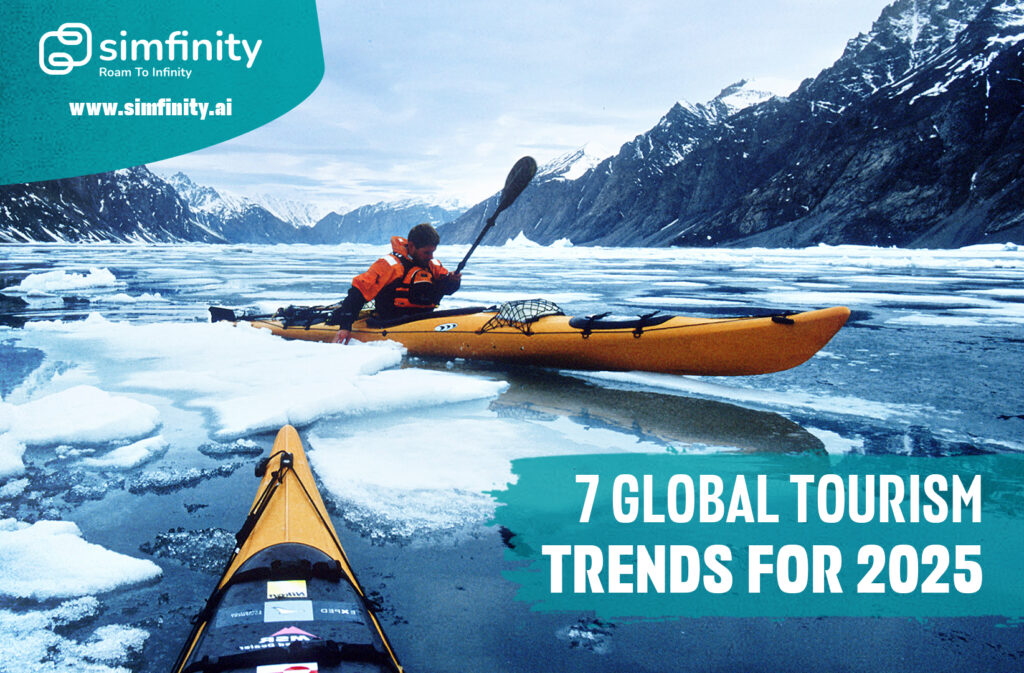The tourism industry is rapidly evolving under the influence of new technologies, climate change, and shifting traveler demands. By 2025, experts identify several key trends that are already gaining popularity and are likely to shape the travel experiences of the future.
1. Sustainable and Eco-Tourism: Conscious Travel
Why is it trending?
Travelers are increasingly mindful of the environmental impact of their journeys. With global climate change being a pressing concern, this trend is more relevant than ever.
What’s in trend?
- Eco-friendly hotels and resortshttps://www.greenpearls.com/: Accommodations with certifications like LEED or Green Key are gaining favor. Travelers are opting for stays at properties that use solar energy, recycle waste, and conserve water.
- Carbon-neutral travel: Many travelers are offsetting their carbon footprints through programs supporting environmental projects.
- Slow travel: This movement promotes longer trips using trains, bicycles, or walking instead of flights or buses.
- Popular destinations: Costa Rica, Iceland, and Sweden, which actively promote sustainable tourism initiatives.

Who is it for?
Eco-conscious travelers who want to minimize their impact on the planet.
2. Workation: Traveling While Working Remotely
Why is it trending?
With the rise of remote work, travelers are no longer tied to offices and can work from anywhere in the world.
What’s in trend?
- Long-term rentals: Travelers book apartments or houses for months instead of days, combining work with leisure.
- Flexible co-working spaces: Hotels and resorts now offer co-working areas with high-speed internet and dedicated work zones.
- Workation programs: Countries like Portugal, Barbados, and the UAE provide special visas for digital nomads, allowing stays of up to a year.

Popular destinations: Thailand, Bali, Spain, the Canary Islands, and other locations with reliable internet and affordable living costs.
Who is it for?
Freelancers, IT professionals, remote workers, and digital nomads looking to work with a view of the sea or mountains.
3. Wellness Tourism: Prioritizing Mental Health
Why is it trending?
Post-pandemic, travelers are prioritizing their physical and mental well-being. Trips aimed at restoration and relaxation are in high demand.
What’s in trend?
- Detox retreats: Programs for body cleansing and healthy nutrition in specialized hotels and wellness centers.
- Meditation and yoga retreats: Destinations like India, Indonesia, and Thailand are popular for these soul-recharging experiences.
- Anti-stress programs: Hotels and resorts offer tailored solutions, from spa treatments to therapeutic nature walks.

Who is it for?
Those seeking a break from city life and focusing on their health and well-being.
4. Micro-Travel and Short Getaways
Why is it trending?
Busy schedules make short, frequent trips more appealing than one long vacation.
What’s in trend?
- Staycations: Local vacations within your city or nearby areas offer an economical and time-saving alternative.
- Weekend escapes: Quick trips by train or car to nearby destinations for a change of scenery.
- “Hotel weekends”: All-inclusive stays even for short breaks are becoming popular.
Who is it for?
Busy professionals who can’t afford extended time off.
5. Virtual Tourism and AR Technology
Why is it trending?
Virtual Reality (VR) and Augmented Reality (AR) are becoming more accessible, allowing people to “visit” places without leaving home.
What’s in trend?
- VR tourism: Visiting museums, exhibitions, and landmarks through VR headsets.
- AR tours: Walking through cities with an AR guide showing how streets appeared in the past.
- Tourism without limits: Providing virtual travel opportunities for those with disabilities or financial constraints.

Who is it for?
People unable to travel physically or those who want to preview a destination before their trip.
6. Personalized Travel and Unique Experiences
Why is it trending?
Today’s travelers seek tailored experiences rather than standardized packages.
What’s in trend?
- Custom itineraries: Travel companies create tours based on individual preferences, from private safaris to yacht cruises.
- Exclusive access: Visitors crave entry to private events, museums, and restricted sites.
- Luxury travel: Stays at unique places like private villas in the Maldives or exclusive islands.

Who is it for?
Travelers seeking bespoke experiences and valuing personal attention.
7. Adventure and Experience-Driven Travel
Why is it trending?
Travelers increasingly prioritize unique and thrilling experiences over traditional relaxation.
What’s in trend?
- Adrenaline tours: Skydiving, shark diving, and extreme mountain treks.
- Culinary trips: Exploring local cuisines and taking cooking classes.
- “Dark tourism“: Visiting sites with historical significance, such as Chernobyl or Hiroshima.

Who is it for?
Adventure enthusiasts, foodies, and those who enjoy unconventional travel formats.
Tourism in 2025: Thoughtful, Flexible, and Tech-Driven
Travel in 2025 will focus on sustainability, personalization, and new technologies. More travelers will seek unique experiences and seamless ways to work while on the move. With the rise of eco-tourism, VR adventures, and digital nomad programs, travel is becoming smarter and more conscious.
One key innovation enhancing travel experiences is eSIM technology. eSIM offers a seamless, flexible, and sustainable solution for staying connected while exploring the globe. Instead of relying on traditional SIM cards, eSIM allows you to activate a local or global data plan directly on your device, saving you time and money.
Why is eSIM essential for 2025 travel?
- Eco-Friendly Connectivity: No plastic SIM cards mean less waste, aligning perfectly with sustainable travel practices.
- Global Access: Stay connected in multiple countries without switching physical cards. Perfect for digital nomads and multi-destination trips.
- Convenience: Activate eSIM instantly via QR codes, ensuring you’re always online for navigation, remote work, or sharing memories.
- Cost-Effective: Avoid hefty roaming charges by choosing affordable local or international data plans.
As you plan your 2025 journeys, explore these emerging formats to see the world while preserving the planet – and don’t forget to equip your device with an eSIM. It’s the smart, eco-conscious traveler’s must-have companion.


